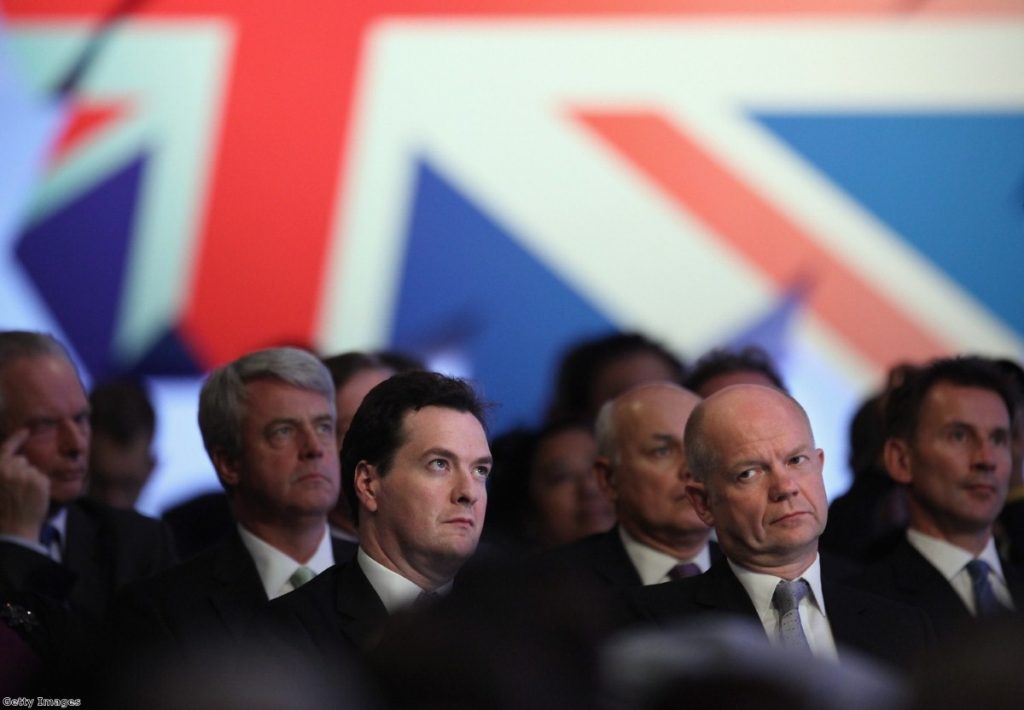Cameron speech analysis: 5 key moments
Five key moments from today's conference speech and what they tell us about David Cameron and the Conservative party.
1) Reading material
Jokes often tell you more about the reality of a situation than the rest of the speech put together. That was never more true than today. Cameron used a scheme Cabinet secretaries had been involved in to read books aloud for the blind to make jokes at their expense.
The jibes were sharper than expected. While Boris Johnson got away with a cycling title harking back to the 'Boris bikes', George Osborne was linked to 'The Man who Would be King'. The joke played on media reports of his leadership ambitions but also tacitly recommended him against the London mayor – who is widely tipped to be competing for the job.


The real damage was reserved for Ken Clarke, however, who was handed 'Crime and Punishment' – a jibe at his liberal tendencies as justice secretary. A moment later, Cameron raised 'Mog the Cat' – a play on the 'cat-gate' row between Clarke and Theresa May. Cameron joked that in the book the cat didn’t lead to a foreign prisoner being kept in the UK, really rubbing Clarke's face in it and substantiated reports that Downing Street had taken the home secretary's side.
2) The credit card debacle
Cameron rapidly rewrote a pre-released section of the speech on paying back credit card debt, to prevent inadvertently triggering another recession. The original text read "that means households paying off the credit card", but many commentators pointed out that this sounded as if the prime minister was encouraging families to rapidly pay back their debts as soon as possible.
Such a move would have potentially triggered an even worse economic outlook by decreasing consumer spending. Politically, it also have made Cameron look dangerously out-of-touch, with many families struggling to find the money for day-to-day needs, let alone stepping up their debt repayments. The final version read: "That's why households are paying down their credit cards".
A last minute scramble saved the prime minister from explicitly going against Bank of England policy, putting the economy at risk and making himself appear desperately disconnected from the concerns of the public. He may like to present himself as a steady hand, but this passage shows how easy it can be to slip up.
3) The invisible foundation
Cameron's Conservative's have been fond of housing metaphors for the economy, not least the 'fixing the roof while the sun was shining' line, which was deployed daily for at least two years. Today, the Tory leader deployed another which you can expect to hear more of.
"The new economy we're building: it’s like building a house," he said. "The most important part is the part you can't see – the foundations that make it stable. Slowly, but surely, we're laying the foundations for a better future. But this is the crucial point: it will only work if we stick with it."
The metaphor tackles the growing sense of doubt around the government's economic agenda and responds to demands that it adopt a Plan B. it also has a strong sense of reliability and responsibility which chimes with Cameron's main message on leadership.
That leadership message itself, which was alluded to throughout the speech, highlights what he considers his strategic assets against Miliband and, when 2015 comes, Nick Clegg: perceived competence. Party strategists recognise the public's acceptance of him in the statesman's role and will play to that strength.
4) Labour attack
Cameron's best moments, and those most appreciated by the hall, were predictably party political. While he never mentioned Ed Miliband by name – an interesting footnote – he absolutely went to town on Labour, deploying increasingly exotic attacks on the party, including the insinuation that it and fellow travellers practise "oppression" against the disadvantaged.
But the prime minister's most effective line came when he highlighted the booing which broke out in the Labour conference at the mention of Tony Blair's name. "You know what?" Cameron said. "We don't boo our leaders. We're proud of our past and what those people did for our country."
The comment prompted the longest round of applause of the speech and served to highlight Labour's internal squabbles in contrast to Cameron's 'strong leadership' theme.
5) Gay marriage
The section of the speech which will probably be best remembered came when Cameron praised the idea of gay marriage, to a surprising round of applause. "I don’t support gay marriage despite being a Conservative," Mr Cameron told delegates. "I support gay marriage because I'm a Conservative."
The PM's clever decision to mesh a right wing (married couples' tax breaks) and left wing (gay marriage) idea together into a coherent political stance may have sold the prospect in a language delegates could understand, but the moment felt important nonetheless. Online, left wing commentators fell over themselves to congratulate the prime minister. With all three parties now on board and Tory members showing their willingness to countenance it, the policy looks almost certain to become a reality.

